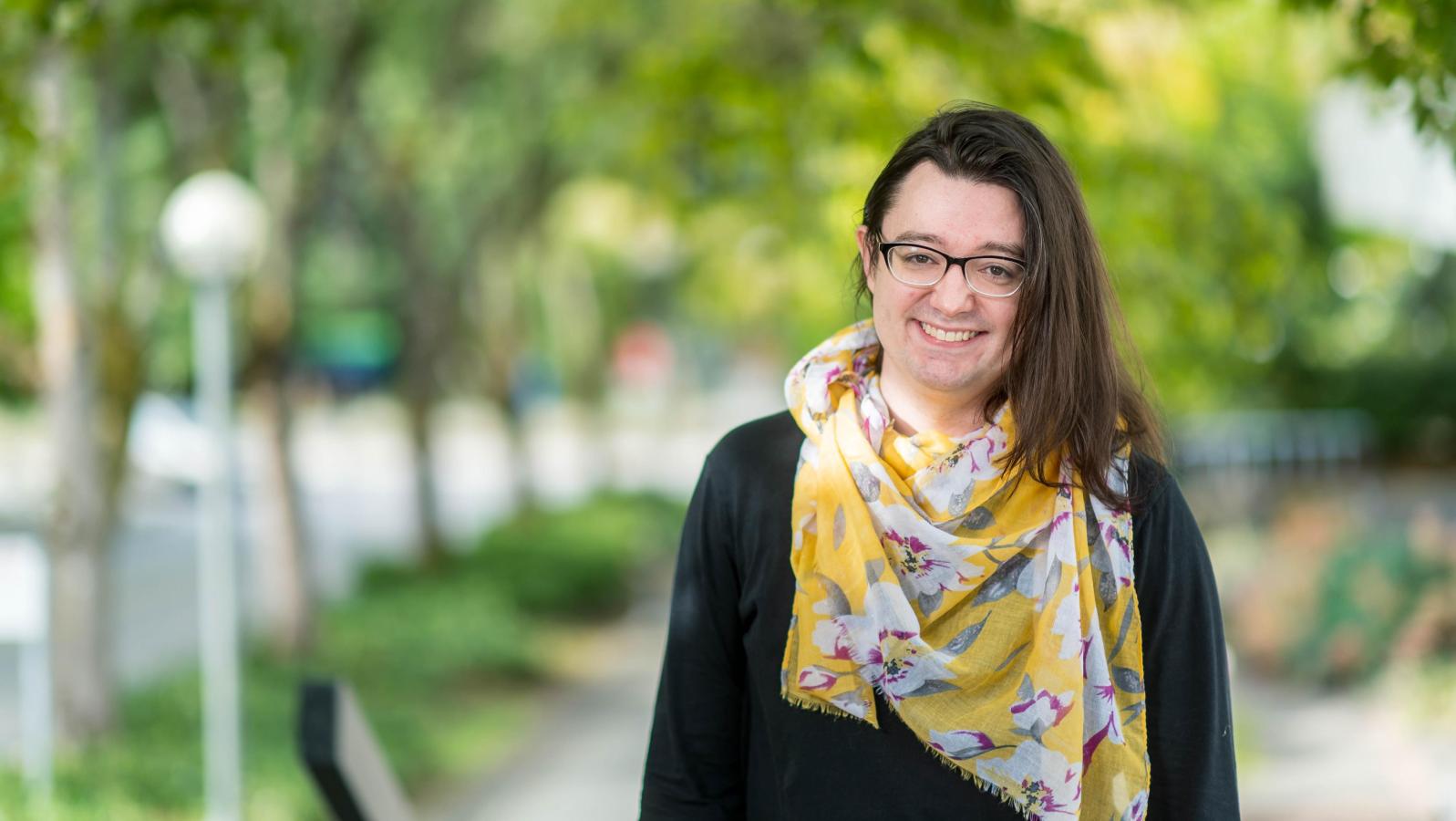

Bri Watson, UBC iSchool Doctoral Student | Photo credit: UBC Graduate and Postdoctoral Studies
Congratulations to UBC iSchool Doctoral student Bri Watson for receiving the 2022 Vanier Canada Graduate Scholarships (Vanier CGS) award! This year, a total of 18 doctoral students at UBC have received Vanier Scholarships, three of them within the Faculty of Arts.
In addition to pursuing a doctoral degree, Bri runs the history of sexuality project HistSex.org and contributes to Homosaurus, an international linked data vocabulary for queer terminology. Their current research interests are equitable cataloging in GLAMS (Galleries, Archives, Libraries, Museums, & Special Collections), linked data vocabularies, histories of sexuality, knowledge organization, and archival studies. Working with names and naming, Bri seeks to address and help redress the harms done to the Two-Spirit, transgender, non-binary, gender diverse and/or gender nonconforming individuals and communities. Their research uses “linked data” technology to supplant outdated terms, allowing people and communities to use accurate and relevant terminology derived from their own lives.
What does it mean to you to receive this award?
It means a lot! Although I’ve had some time to get used to the news, it still seems surreal to me sometimes! Partially, I think this is because I’m a multiply-marginalized student (first-generation, disabled, queer, and nonbinary), and I’ve never had role models or seen other people “like me” receive recognition in this way. I personally recognize and know the impact that “seeing oneself existing” can have, and this is one of the reasons that my work at the iSchool and my activism elsewhere centers around GLAMS (Galleries, Libraries, Archives, Museums, and Special Collections).
What impact would you want your research to have in the field?
The accelerating trend of cultural heritage digitization provides an invaluable opportunity to examine and correct past injustices in description and naming. Despite this, GLAMS dedicated to documenting and preserving sometimes-ephemeral identities utilize systems that describe marginalized groups in ways that have been criticized as inadequate or outrightly oppressive. My research is motivated by the necessity of the knowledge organization field to meet this urgent need and create spaces of reclamation, redescription, reappropriation, and renaming.
My training as a Historian has helped me understand that the ways information systems developed are structured and change was deliberate. The racism, sexism, ableism, homophobia, and colonialism of information systems are not accidents but manifestations of a system doing what it was designed to do. It is not enough to simply revise the more harmful aspects of knowledge organization systems and try to make hateful systems more humane in small ways. We are also required to uproot them and build alternatives. These terms are not neutral but charged with historical import and personal meaning, and they gesture at our innermost desires and dreams and our outward goals and accomplishments.
My research encourages individuals and institutions to think productively about how their identities and intersections are historically constructed and contemporaneously utilized. Many people are marginalized (and multiply so), and the intersections (*) that our identities exist at are reductive and limiting, but they can also be productive and generating. Cataloging and classification, data and its metadata are profoundly powerful tools, and words are tools that can be used to reshape worlds.
(*) (Kimberlee Crenshaw)
How can your research benefit the general public?
I strongly believe that the work of the ivory tower must also be the work of the ivied public libraries, and I have attempted to practice this philosophy throughout my career. However, to the general public, my work and activism focus areas are often ‘invisible,’ much in the same way that “information” itself is invisible. To provide a more material example:
Over the past few years, GLAMS have spent millions of dollars in the name of Equity and Diversity to acquire the work of the marginalized and minoritized. Governments and cultural organizations have also been spending untold amounts of money on getting resources and information to the right places. But if these works and information do not use accurate, relevant and timely terminology, they will remain undiscoverable and, therefore, cannot serve as sites of power, affirmation, or resistance.
To use a personal example, until organizations use my identity terms (crip, queer, demisexual, polyam), they cannot represent me, and the same holds true for others. In order to achieve their goals, I believe organizations need to invite and encourage more diverse input and turn over “the power to name” to those who are named and labelled by systems.
About the Vanier Canada Graduate Scholarships
The Vanier Canada Graduate Scholarships (Vanier CGS) program is designed to attract and retain world-class doctoral students by supporting students who demonstrate both leadership skills and a high standard of scholarly achievement in graduate studies in the social sciences and humanities, natural sciences and engineering, and health-related fields.


